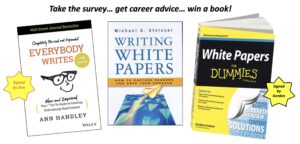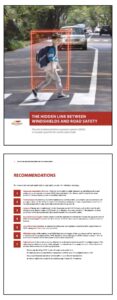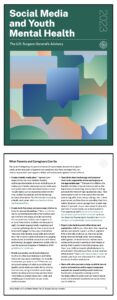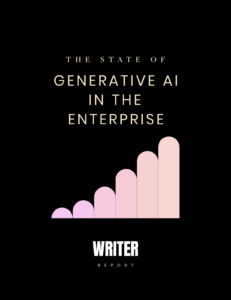White Paper World 23: June 8, 2023
- June Book Giveaway: Take the AI survey, get career advice, win a book!
- Quick tip: Using multiple calls-to-action
- This just in: Survey of corporate AI usage
June Book Giveaway: Take the AI survey, get career advice, win a book!
I’ve been working on this for weeks: a quick survey to find your attitude to AI.
The multiple-choice questions will take you less than 2 minutes to answer.
Depending on your answers, I’ll send you some brief career advice for writers in the era of AI.
Plus, you’ll be entered in a series of draws in my biggest-ever Book Giveaway.
If your name is picked, you can have your choice of three great books about writing and white papers:
- Signed hardcover of Ann Handley’s Everybody Writes, 2nd edition
- Hardcover of Mike Stelzner’s Writing White Papers
- Signed copy of my book White Papers For Dummies
Click the graphic, or use this link:
https://app.assessmentgenerator.com/assessment/20536
And feel free to forward this link to any other writers you know.
I can’t wait to see how the answers stack up, and to send out those books to the winners!
Hint: The first draw is THIS WEEKEND June 10!
Quick tip: Using multiple calls-to-action
You’ve heard the classic advice: Use a single call-to-action.
Make it crystal clear what an interested prospect should do after they read your white paper.
But what if you have multiple audiences?
What if one call-to-action isn’t enough?
There’s a simple way to handle that: Just specify a different call-to-action for each segment of the audience.
Here are two white papers that show this tip in action.
CTAs for multiple audiences of a B2B white paper
This white paper explained that many automated safety features rely on cameras build into a car’s windshield.
And those cameras must be calibrated… which no DIYer or local garage can do.
There were seven different audience segments, the most I’ve ever tried to address in a single white paper:
• Consumer associations
• Fleet managers
• Insurance companies
• Journalists and bloggers
• OEM car dealers
• Police
• Policy-makers
At the end, this paper introduced a CTA for each audience with the line:
We recommend that each stakeholder in road safety consider the following next steps.
This is a perfectly fine way to handle this challenge when you have just a couple of next steps for each segment.
< Click the image to see this white paper
CTAs for multiple audiences of a government report
In May 2023, the U.S. Surgeon General released a report on teens and social media.
This 19-page report makes fascinating reading. And I consider it basically a problem/solution white paper.
After all, it’s a persuasive essay that uses facts and logic to present new approaches to a nagging problem.
And it addresses five discrete audiences:
• Parents and caregivers
• Children and teens
• Researchers
• Policy-makers
• Tech company executives
The final recommendations are given on a separate page for each audience. That way, each reader can flip to the page for them.
Anyone who falls into two different audiences—say parent and tech exec—can look at the pages for each.
That’s a perfectly fine way to handle this challenge when you have many recommendations for each audience.
< Click the image to see this report
There are many benefits to this approach:
- No one gets confused
- No one gets overlooked
- Everyone can see the recommendations for one another
- You can do one white paper for everyone, instead of one for each audience
Make sense? Try this next time you work on a paper with multiple audiences.
This just in: Survey of AI usage in companies
Writer, the team-based writing system, uses AI to help ensure all your communications sound the same and follow the same guidelines.
It’s one of the few AI tools built specifically for writers and I like it a lot. If I were running a marketing team, I’d have everyone using this service immediately.
Writer just released an intriguing survey that shows how far AI has penetrated into the corporate world.
Here are a few tidbits:
• 59% of companies now use AI or plan to use it this year
• AI is used in every function, not just marketing
• ChatGPT is the most-used (47%) and most-banned service (32%)
• The next most popular services are CopyAI (35%), Anyword (26%),
Hyperwrite (24%) and Jasper (23%)
• Only 7% say their firms don’t use generative AI and they don’t know anyone using it at work
• Marketing people say the top benefits are better content and lower costs
Companies use AI to create short copy, like ads and headlines, and (so-called) long content, like blogs, and to repurpose existing content.
All-in-all, the report says these numbers prove AI has crossed over from the early adopters and hit the mainstream.
But there are some drawbacks. Almost half (46%) believe their colleagues have over-shared corporate information with AI.
The other top perceived drawbacks of generative AI are privacy, message consistency, accuracy, and copyright.
Click the thumbnail above to get your own copy of The State of Generative AI in the Enterprise.
That’s all for this issue.
You can see all the back issues of White Paper World here: www.thatwhitepaperguy.com/newsletters/
And to see every future issue, make sure to subscribe here:
www.thatwhitepaperguy.com/subscribe/

Gordon Graham
That White Paper Guy
P.S. Remember to take the survey on AI right away for your best chance to win a free book!!







